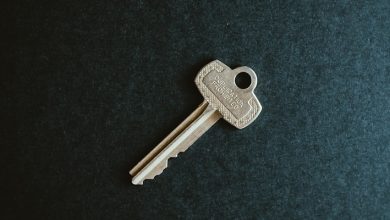How to Keep Your Personal Information Private on Exchanges

- Understanding the risks of sharing personal information on exchanges
- Tips for creating strong and secure passwords on exchange platforms
- The importance of enabling two-factor authentication for added security
- How to safely navigate through privacy settings on exchange accounts
- Best practices for verifying the legitimacy of exchange platforms
- Why it’s crucial to regularly update and monitor your personal information on exchanges
Understanding the risks of sharing personal information on exchanges
When using exchanges to buy or sell cryptocurrencies, it’s important to understand the risks of sharing personal information. Exchanges often require users to provide sensitive information such as their name, address, and even social security number. While this information is necessary for compliance purposes, it also puts users at risk of identity theft and fraud.
By sharing personal information on exchanges, users are essentially trusting these platforms to keep their data secure. However, exchanges have been known to fall victim to data breaches and hacks, resulting in the exposure of users’ personal information. This can lead to a variety of negative consequences, including financial loss and damage to one’s reputation.
To mitigate these risks, users should be cautious about the type of information they share on exchanges. It’s important to only provide information that is absolutely necessary for trading purposes and to avoid sharing more than what is required. Additionally, users should consider using pseudonyms or nicknames instead of their real names to protect their identity.
Tips for creating strong and secure passwords on exchange platforms
When it comes to creating strong and secure passwords on exchange platforms, there are several tips that you can follow to help keep your personal information private. By following these guidelines, you can minimize the risk of your account being compromised by hackers.
- Use a combination of uppercase and lowercase letters, numbers, and special characters in your password
- Avoid using easily guessable information such as your name, birthdate, or common words
- Make sure your password is at least 12 characters long
- Consider using a password manager to help generate and store complex passwords
- Change your password regularly to reduce the likelihood of unauthorized access to your account
By following these tips, you can significantly enhance the security of your account on exchange platforms. Remember, a strong password is a crucial first line of defense in protecting your personal information from cyber threats.
The importance of enabling two-factor authentication for added security
Enabling two-factor authentication (2FA) is crucial to enhance the security of your personal information on exchanges. 2FA adds an extra layer of protection by requiring users to provide two different types of verification before accessing their accounts. This means that even if a malicious actor gains access to your password, they would still need another form of verification, such as a code sent to your phone, to log in.
By enabling 2FA, you significantly reduce the risk of unauthorized access to your account. Hackers often target exchanges to steal personal information and funds, so having an extra security measure in place is essential. Additionally, enabling 2FA can help prevent potential phishing attacks, where cybercriminals attempt to trick you into revealing sensitive information.
It is important to choose a secure method for 2FA, such as using an authenticator app instead of SMS verification, as SMS can be vulnerable to SIM swapping attacks. Remember to keep your 2FA method secure and avoid sharing it with anyone. Taking these steps will go a long way in keeping your personal information private and secure on exchanges.
How to safely navigate through privacy settings on exchange accounts
When it comes to keeping your personal information safe on exchange accounts, navigating through privacy settings is crucial. By taking the time to review and adjust these settings, you can control who has access to your data and minimize the risk of unauthorized access.
One of the first steps to enhancing your privacy on exchanges is to familiarize yourself with the different privacy options available. This may include settings related to account visibility, data sharing, and security features. By understanding what each setting entails, you can make informed decisions about how to best protect your information.
Once you have a clear understanding of the privacy settings on your exchange account, take the time to review and adjust them according to your preferences. This may involve limiting the visibility of your account to only trusted contacts, opting out of data sharing agreements, or enabling two-factor authentication for an added layer of security.
It’s also important to regularly monitor your privacy settings and make updates as needed. As technology evolves and new threats emerge, staying vigilant about your privacy settings can help ensure that your personal information remains secure. By staying proactive and informed, you can better protect yourself from potential privacy breaches on exchange accounts.
Best practices for verifying the legitimacy of exchange platforms
When it comes to ensuring the safety of your personal information on exchange platforms, verifying the legitimacy of the platform is crucial. There are several best practices to follow to ensure you are using a reputable and secure exchange platform.
- Check for proper licensing and regulation: Look for information on the exchange platform’s website regarding their licensing and regulation. A legitimate exchange will typically be licensed by a reputable financial authority.
- Research the company background: Take the time to research the company behind the exchange platform. Look for information about the team, their experience in the industry, and any past incidents or controversies.
- Read user reviews and feedback: User reviews can provide valuable insights into the reputation and trustworthiness of an exchange platform. Look for reviews on third-party websites and forums to get a well-rounded view.
- Verify security measures: Security is paramount when it comes to protecting your personal information. Ensure the exchange platform has robust security measures in place, such as encryption, two-factor authentication, and cold storage for funds.
- Avoid platforms with unrealistic promises: Be wary of exchange platforms that make unrealistic promises or guarantees, such as high returns with little to no risk. These could be red flags for potential scams.
By following these best practices for verifying the legitimacy of exchange platforms, you can better protect your personal information and ensure a safe trading experience. Remember, it’s always better to be cautious and thorough in your research than to risk falling victim to fraud or identity theft.
Why it’s crucial to regularly update and monitor your personal information on exchanges
Regularly updating and monitoring your personal information on exchanges is crucial for maintaining your privacy and security. By keeping your information up to date, you can ensure that any changes in your personal details are accurately reflected in the exchange’s records. This can help prevent unauthorized access to your account and protect you from identity theft.
Monitoring your personal information on exchanges also allows you to detect any suspicious activity or unauthorized changes to your account. By regularly reviewing your account details, you can identify any discrepancies or unfamiliar transactions, which may indicate that your account has been compromised. Taking proactive steps to address these issues can help safeguard your personal information and prevent further unauthorized access.
Additionally, updating and monitoring your personal information on exchanges can help you maintain control over your data and ensure that it is accurate and up to date. By regularly reviewing and verifying your information, you can make sure that the exchange has the correct details on file and that any changes are legitimate. This can help prevent misunderstandings or errors that could impact your ability to access or use your account.



